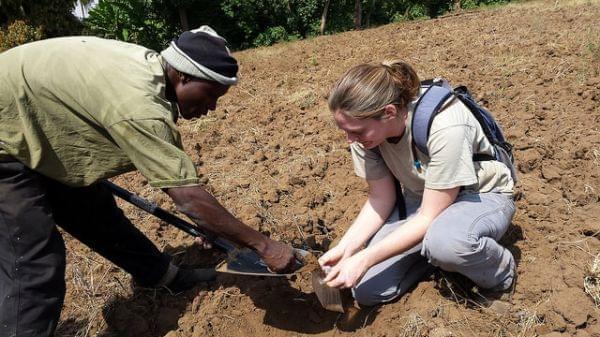Central Illinois Farmer Teaches Workshop for Farmers in East Africa

Shea Belahi teaches farmers in Tanzania about soil health. (Photo: Shea Belahi)
Shea Belahi grew up always wanting to have her own garden
"My dad lived out in the country, and he had some friends that ran a big garden, and I would get in trouble because I would pick vegetables and they weren’t ours, and I always swore when I got older I would have a garden in my backyard,” said Belahi.
Over time, that hobby turned into a full time job.
Belahi started her own small business Heirloominous Farms in Urbana, which unexpectedly grew into an opportunity to teach farmers in East Africa.
“It was really shocking, right before Christmas this opportunity for Tanzania happened," said Belahi, "and I was again, totally in shock that farming could send me around the world and do work that I think is really important as well.”
For three weeks, Shea helped farmers learn about different ways to grow food without having to use chemicals and pesticides on their crops or in the soil.
Shea said taught mostly about resources on pest and disease identification.
"I talked a lot about soil health and the role of composting. We built a compost pile and we did a lot of soil testing,” said Belahi.
A big focus for the farmers was the organic movement that’s growing worldwide
"They were really interested in the organic movement. It’s not happening in Africa yet, but they know the rest of the world is moving towards organics, and they can’t sell their produce or export it because they are highly using chemicals,” said Belahi.
According to a federal report, Agriculture makes up a third of Tanzania’s economy.
Shea traveled as part of an exchange program from Catholic Relief Services and the United States Agency for International Development called Farmer-to-Farmer.
The program connects farmers from around the world to trade ideas about some of the common problems they face -- like crop management, pest control and food production.
To Shea, it was an equal exchange.
“The one thing I took away from the farms and from the people that I worked with is that nothing goes to waste," she said, "every single thing that comes off of their property or their farms wither goes to animals or family, or they sell it. I would like to be able to expand that on my farm and any produce that isn’t used gets donated somewhere.”
To do that Back in Urbana, Shea hopes to continue to get more people involved in growing their own food.

